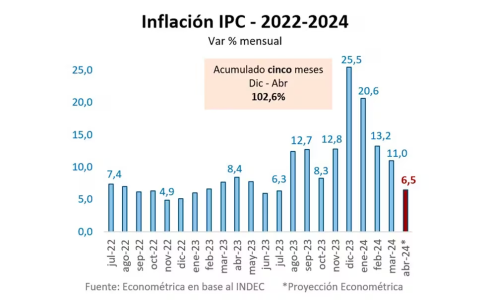All the Answers
Well-known member
Milei's optimism due to the slowdown in inflation: what do you think will happen this month with the consumer price index - Infobae

Source:

Optimismo de Milei por la desaceleración de la inflación: qué cree que pasará este mes con el índice de precios al consumidor
El Presidente considera que la inflación núcleo, que no toma en cuenta los precios regulados ni estacionales, mostrará un resultado mejor que el IPC general
April 22, 2024
The President considers that core inflation, which does not take into account regulated or seasonal prices, will show a better result than the general CPI
By Martin Kanenguiser

Milei's optimism for inflation: what do you think will happen to the consumer price index this month
President Javier Milei believes that the consumer price index for April could still remain in double digits, although he is confident that core inflation will be in single digits.
While preparing his message for tonight, in which he will confirm that March was another month of fiscal surplus, he stated that the increase in regulated prices would prevent the Indec CPI from reaching double digits this month.
Very close to the president, they indicated to Infobae that it is likely that core inflation, which does not take into account either seasonal or regulated prices, will be in single digits this month.
On the other hand, the increase in services regulated by the Government – urban transportation (60%), gas (300%) and water (200%) – plus another increase in fuel (5% on average) played against the process of slowing inflation. “Correct” they indicated when asked if these increases would prevent reaching the digit this month.

Inflation according to Econometrica
It remains to be seen what finally happens with the fees for prepaid medicine, on which the Government imposed a cap, so the CPI could be cut by around 0.5%.
In this sense, Econometrica estimated that inflation would close the month at around 6.5%, while ECO GO calculated 8.5% and the core at 8%; Analytica, for its part, predicts 11% for April.
Federico Moll of Ecolatina maintained that “inflation in the first fortnight was 9.1%, which leads us to estimate a month in the order of 9%, largely explained by the increase in regulated services, increases in gas, water and public transport, with food growing well below, especially when it comes to packaged foods.”
Meanwhile, FIEL indicated that "Core Inflation - which does not include seasonal or regulated products, making it the best indicator to analyze the inflationary trend - registered the smallest increase for a second week of the month since last September."
“In the last 4 weeks, Core Inflation grew 8.1% and 306.4% in the last 12 months,” it stated in its latest report.
For its part, Econviews indicated that “the high-frequency data that we measured in supermarket chains in Greater Buenos Aires (food and personal care products) showed us deflation for the first time since we did this exercise.”
“There is no doubt that there was good news. The recession makes there a greater predisposition to reduce margins. The wholesale inflation of 5.4% in March somehow anticipates that tradable prices will loosen in April,” indicated Miguel Kiguel's consulting firm.
“Our base scenario has already been adjusted from 10 to 9% for the current month and we do not rule out correcting downwards again,” said Andrés Borenstein's team.
However, he clarified that “it is important to note that this is a part of inflation.”
“Perhaps the most visible because the supermarket or the store are important expenses in all homes. But it is clear that services do not come as well as goods,” she indicated.
In particular, “the supply of gas will be a headache for families in May, but it will enter the CPI for April. In May we don't know what will happen, but it is possible that salaries will make a comeback or public transport will rise again, which, at least in the GBA, has stood still since February."
“The message is: 'let's not underestimate inertia' and. “With the rise in salaries and other non-tradable costs for companies, the drop in margins cannot last forever.”
“So we suggest not claiming victory prematurely. That is, April looks like a good month for inflation, but the battle is not even remotely won,” Econviews stated.
“Additionally, as we say, one of the secondary effects of the drop in inflation is the exchange rate delay, which in static terms we do not see as serious, but in dynamics it can be. April could also benefit if prepaid payments not only do not increase, but also return part of the increases collected."
“This issue is being controversial far beyond inflation. It is important in terms of organization of the economy. Prepaid medicine companies adjusted 70% of inflation between 2017 and 2023. And since then 120% of inflation. That is to say, if we take 2017 as the balance point (something reasonable, although debatable), prepaid companies would not have to return the increases but rather continue rising to return to 2017,” he concluded in his report.
The International Monetary Fund estimated that inflation will end at 150% this year and 45% next year.


